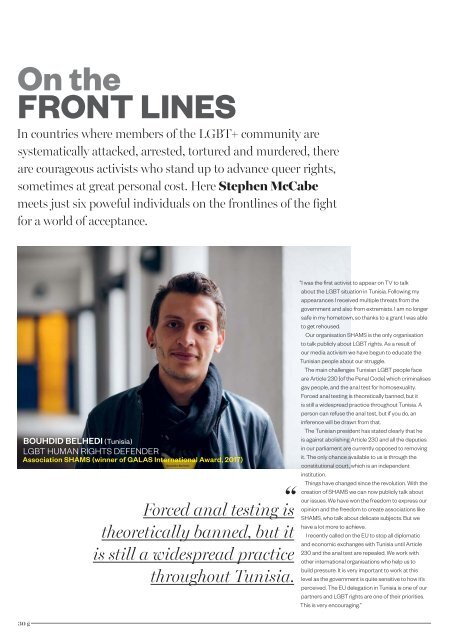Create successful ePaper yourself
Turn your PDF publications into a flip-book with our unique Google optimized e-Paper software.
On the<br />
FRONT LINES<br />
In countries where members of the LGBT+ community are<br />
systematically attacked, arrested, tortured and murdered, there<br />
are courageous activists who stand up to advance queer rights,<br />
sometimes at great personal cost. Here Stephen McCabe<br />
meets just six poweful individuals on the frontlines of the ight<br />
for a world of acceptance.<br />
BOUHDID BELHEDI (Tunisia)<br />
LGBT HUMAN RIGHTS DEFENDER<br />
Association SHAMS (winner of GALAS International Award, 2017)<br />
“<br />
Forced anal testing is<br />
theoretically banned, but it<br />
is still a widespread practice<br />
throughout Tunisia.<br />
“I was the first activist to appear on TV to talk<br />
about the LGBT situation in Tunisia. Following my<br />
appearances I received multiple threats from the<br />
government and also from extremists. I am no longer<br />
safe in my hometown, so thanks to a grant I was able<br />
to get rehoused.<br />
Our organisation SHAMS is the only organisation<br />
to talk publicly about LGBT rights. As a result of<br />
our media activism we have begun to educate the<br />
Tunisian people about our struggle.<br />
The main challenges Tunisian LGBT people face<br />
are Article 230 [of the Penal Code] which criminalises<br />
gay people, and the anal test for homosexuality.<br />
Forced anal testing is theoretically banned, but it<br />
is still a widespread practice throughout Tunisia. A<br />
person can refuse the anal test, but if you do, an<br />
inference will be drawn from that.<br />
The Tunisian president has stated clearly that he<br />
is against abolishing Article 230 and all the deputies<br />
in our parliament are currently opposed to removing<br />
it. The only chance available to us is through the<br />
constitutional court, which is an independent<br />
institution.<br />
Things have changed since the revolution. With the<br />
creation of SHAMS we can now publicly talk about<br />
our issues. We have won the freedom to express our<br />
opinion and the freedom to create associations like<br />
SHAMS, who talk about delicate subjects. But we<br />
have a lot more to achieve.<br />
I recently called on the EU to stop all diplomatic<br />
and economic exchanges with Tunisia until Article<br />
230 and the anal test are repealed. We work with<br />
other international organisations who help us to<br />
build pressure. It is very important to work at this<br />
level as the government is quite sensitive to how it’s<br />
perceived. The EU delegation in Tunisia is one of our<br />
partners and LGBT rights are one of their priorities.<br />
This is very encouraging.”<br />
30 g















